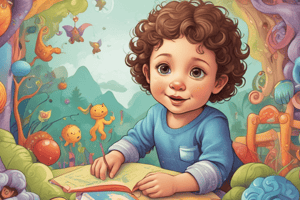Podcast
Questions and Answers
What is the main difference between gross motor skills and fine motor skills?
What is the main difference between gross motor skills and fine motor skills?
- Gross motor skills involve large muscle movements, while fine motor skills involve small movements. (correct)
- Gross motor skills are developed through play, while fine motor skills are developed through interaction with others.
- Gross motor skills involve tasks like using crayons, while fine motor skills involve tasks like hopping.
- Gross motor skills develop around age two, while fine motor skills develop from birth.
At what age do most children have basic gross motor skills like hopping, skipping, and throwing balls?
At what age do most children have basic gross motor skills like hopping, skipping, and throwing balls?
- Age 8
- Age 4
- Age 6 (correct)
- Age 2
Which activity typically helps children develop fine motor skills around age two?
Which activity typically helps children develop fine motor skills around age two?
- Using crayons (correct)
- Dancing
- Cycling
- Swimming
What does the term 'motor skills development' refer to?
What does the term 'motor skills development' refer to?
What is an essential aspect of social skills development?
What is an essential aspect of social skills development?
How do children typically develop motor skills according to the text?
How do children typically develop motor skills according to the text?
Which activity is NOT mentioned as a way children develop social skills?
Which activity is NOT mentioned as a way children develop social skills?
What is the primary focus of child development in this article?
What is the primary focus of child development in this article?
What does cognitive development refer to?
What does cognitive development refer to?
How does emotional development progress?
How does emotional development progress?
Which of the following is a benefit of physical activity in child development?
Which of the following is a benefit of physical activity in child development?
In child development, who plays a crucial role in shaping emotional intelligence?
In child development, who plays a crucial role in shaping emotional intelligence?
Flashcards are hidden until you start studying
Study Notes
Child Development: An Overview of Motor Skills, Social Skills, Cognitive Development, Emotional Development, and Health Benefits
Child development is a complex and multifaceted process that involves several aspects of growth and learning. This article explores child development through a focus on motor skills, social skills, cognitive development, emotional development, and health and fitness benefits.
Motor Skills Development
Motor skills development refers to how children learn to control their bodies and move around in space. It can be divided into gross motor skills (large movements involving big muscle groups like walking and running) and fine motor skills (small movements, like using utensils). Children typically develop these skills through play, interaction with others, and daily activities.
Gross Motor Skills
Children start developing gross motor skills from birth through crawling, standing, and eventually walking. By age six, most children have mastered basic skills like hopping, skipping, and throwing balls. As they grow older, these skills evolve, enabling them to engage in activities like dancing, swimming, and cycling.
Fine Motor Skills
Early gross motor skills development paves the way for fine motor skill development. Children start developing these skills around age two, using simple tools like crayons and scissors. By the time they enter school, they should be able to handle a computer mouse effectively.
Social Skills Development
Social skills development involves learning how to interact and communicate with others. While children naturally pick up certain social skills, parents and teachers play a crucial role in shaping their behavior by modeling appropriate interactions and providing opportunities for children to engage with others.
Children develop social skills through experiences that include playing with peers, sharing toys, taking turns, and engaging in cooperative games. They learn to understand and respond to emotions, practice empathy, and improve self-esteem through communication and interaction with others.
Cognitive Development
Cognitive development refers to the improvement in thinking, memory, perception, and reasoning abilities. It happens in stages, starting with infancy and continuing throughout childhood. At each stage, there are critical milestones that reflect cognitive progression, such as recognizing familiar faces, mastering basic math concepts, and developing complex problem-solving skills.
Emotional Development
Emotional development involves learning how to express and manage emotions, as well as understanding the emotions of others. It is influenced by both nature and nurture, with parents, teachers, and peers playing important roles in shaping children's emotional intelligence. Emotional development progresses through stages that include learning self-regulation, forming relationships, expressing emotions, and developing empathy.
Health and Fitness Benefits
Physical activity plays an essential role in child development. Regular exercise helps improve overall health, including cardiovascular fitness, muscle strength, and flexibility. Physical activity also promotes better sleep quality, reduces stress levels, and enhances mood. In addition to physical benefits, engaging in sports and other forms of exercise provides opportunities for children to practice teamwork, leadership, and other important life skills.
In conclusion, understanding and supporting child development requires awareness of various domains, such as motor skills, social skills, cognitive development, emotional development, and health benefits. Parents, teachers, and caretakers can all contribute positively to this process by providing nurturing environments and engaging experiences tailored to each stage of development.
Studying That Suits You
Use AI to generate personalized quizzes and flashcards to suit your learning preferences.




